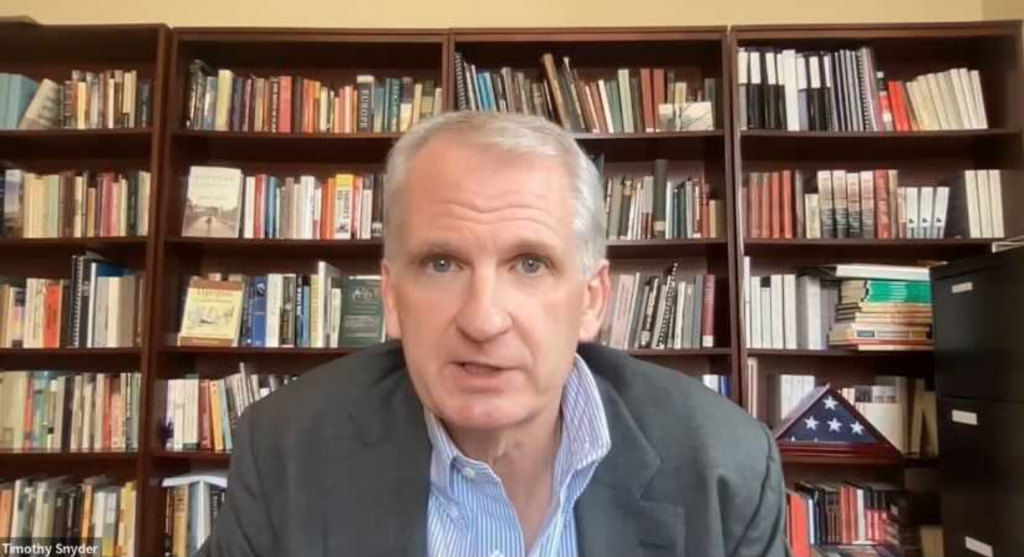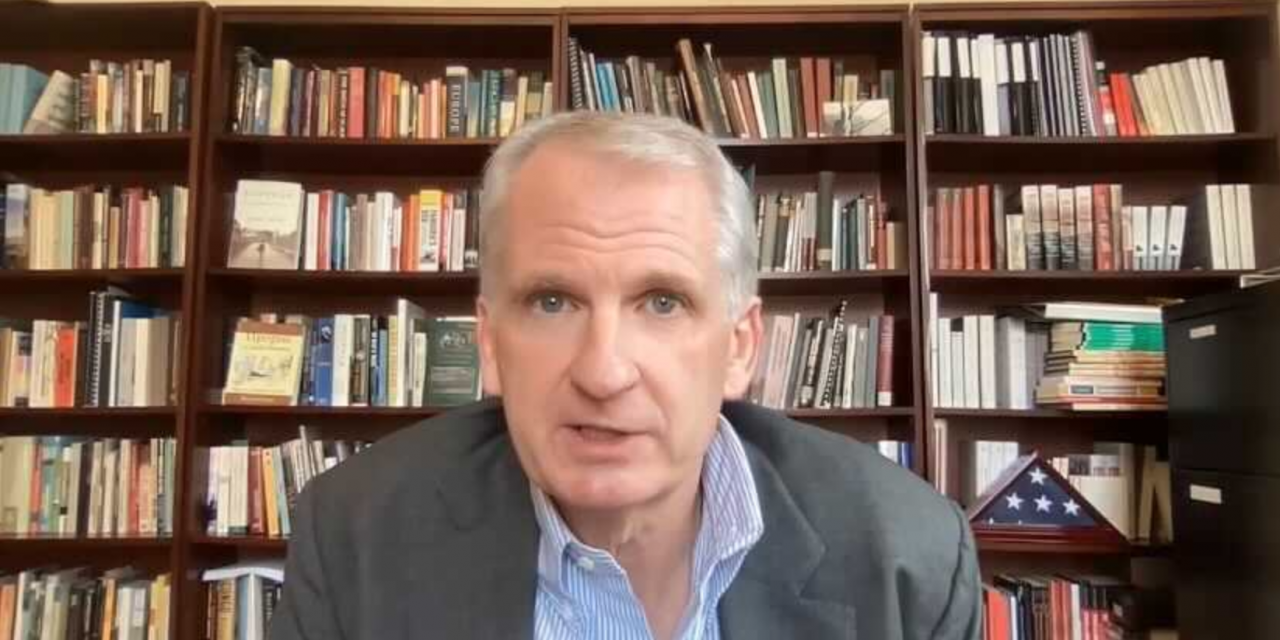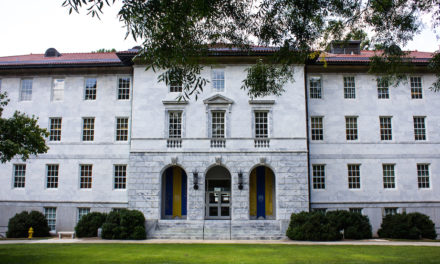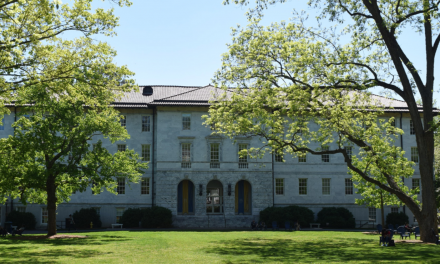Emory University’s Russian, East European and Eurasian Studies Program partnered with the Georgia Institute of Technology to host a webinar on the Russian invasion of Ukraine, “Russia and Ukraine: The Origins of Crisis,” on March 2. The webinar was led by Timothy Snyder, the Richard C. Levin professor of history at Yale University (Conn.).
Professor of Russian Literature Elena Glazov-Corrigan opened the event, followed by Richard Utz, the associate dean for faculty development in the Ivan Allen College of Georgia Tech.
“What are the historical roots of this catastrophe, both national and personal?” Glazov-Corrigan asked. “I know no one who can explain this better and [Snyder’s] analysis will be respected not only by the world at large but also by Ukraine itself.”
Snyder began his lecture by deconstructing the word “conflict,” explaining that the term does not correctly explain Russia’s invasion of Ukraine.
“There isn’t really a long term Ukrainian-Russian conflict,” Snyder said. “Before the year of 2014, the whole idea would’ve seemed rather strange. What we’re dealing with is rather a war, we’re dealing with the invasion of one country by another country.”
Snyder called the war “entirely illegal and unprovoked,” noting Ukraine has not done anything to justify an “external intervention.”
Russia’s justification of the war was associated with Russia President Vladimir Putin’s denial of the existence of a Ukrainian state, according to Snyder.
“The purpose of the invasion was to reach Kyiv, destroy the Ukrainian government, capture and presumably kill its head, its president Volodymyr Zelensky,” Snyder said. “From there, the Ukrainian elite could be destroyed and the remaining undefined masses on the territory of Ukraine would nationally drift to Russia and become part of a larger union.”
Defining genocide, attention to Putin’s ‘atrocity talk’
Snyder clarified that despite Putin’s claims that Russia is fighting against genocide in Ukraine, the Russian dictator’s motive of “destroying part of a nation in order to render the rest of the nation helpless,” should be considered genocidal according to the Genocide Convention’s legal definition of genocide.
“We should remember that when Hitler began the second World War, he did it with exactly the same kind of atrocity talk that Mr. Putin is using today,” Snyder said. “It’s not just that this atrocity talk is a lie … it’s a cover for what the Putin government generally has been, which is a right wing dictatorship. It is a cover for how the Putin government is perceived around the world, which is, as a beacon of hope for white nationalists around the world.”
Snyder further commented that focusing on Putin’s language is particularly important because unlike Russia’s previous invasions under Putin’s government, such as the attack of the Crimean Peninsula in 2014, the attack on Ukraine “was a decision made by one person in the company of very few people.”
He said the Russian people, including most of the elite, seemed unprepared for the attack.
“If we’re trying to explain the causes of it, then we’re all the more justified in concentrating on the language which was used by a very small militia and particularly by this one person,” Snyder explained.

Timothy Snyder, the Richard C. Levin professor of history at Yale University (Conn.) explained the Russian invasion of Ukraine during Emory University’s webinar on March 2. (Tiffany Namkung/Atlanta Campus Desk)
Distinguishing history and myth
Snyder transitioned the conversation to Putin’s replacement of history with “fantastical myths about the ancient world,” as justification of the invasion of Ukraine, calling it a “fascist” action.
Snyder explained that such reliance on myths creates “memory laws,” which he claimed is a vital cause of the Russian invasion. He said memory laws ignore the public’s diverging views of history by “pushing away” the parts that are complicated, divisive and thought provoking.
“They focus on the part that gives us comfort, that tells us that we were always on the right side,” Snyder said. “The tangible political effect of that is that we then believe we must be innocent in whatever we’re doing, no matter how impossible or even crazy that might look from the outside.”
Snyder also said recognizing the Russian dictator’s control of the country’s past and future is important to understanding the Putin regime’s methods.
By constantly emphasizing the Viking clan’s baptism to Eastern Christianity in the year 1,000 and “blood ties” between Russia and Ukraine, Putin is not “making history,” but rather attempting to “restore things back to the way that they’re supposed to be,” Snyder explained.
According to Snyder, the Soviet Union’s justification on occupying Poland in 1939 also utilized memory laws, by alluding that “compatriots on the other side of the border are oppressed and need military rescue.”
Empires and postmodern inequality
Snyder said to fully comprehend the Russian invasion, it is pivotal to look further into the history of European empires.
“In the history of Europe, the basic question in the 20th century and the 21st is what do you do after empire?” Snyder said.
According to Snyder, after the fall of empires, most European nations “thrived” as democratic nation states by integrating in a large European alliance. Russia, however, was an exception.
“Russia is the one important country in Europe which is given decisively the opposite answer,” Snyder pointed out. “That is, the ‘what to do after empire’ is more empire.”
Snyder said that Russia’s continuation of imperialism birthed the largest “postmodern inequality” in the world, “where just a very small number of people seem to control the majority of the wealth, and where the president of the country is at the head of the dominant oligarchical clan.”
Such drastic postmodern inequality gave way to the current war between Russia and Ukraine by eliminating the voices of regular citizens.
“There’s no communication between the top and the bottom about the same world,” Snyder said. “All that’s left is propaganda. You’re in a world where what the state is saying is unbelievably perverse.”
The second way postmodern inequality enabled the war, according to Snyder, is through Russia’s imbalance between minimal domestic policy and heavy dictatorial foreign policy.
“At this level of inequality, it’s impossible to carry out domestic policy,” Snyder said. “All you have access to is foreign policy and the foreign policy you make is not in the interest of the country. [It] is about the story of the ruler.”
War against factuality
Snyder pointed out that understanding the complexities of Russian-Ukrainian relations is also crucial to assess what the war means for the future.
He further emphasized that aside from the battlefield and the international economy, this war is also “being fought across the dimension of factuality,” citing Russia’s ongoing war censorship and ban of independent media.
“It is a war not just about a competition of propaganda, it’s also a war about the possibility of simple facts reaching people,” Snyder explained. “You and I may know that a bomb fell on Babi Yar yesterday and killed five people, but I’m not sure how many Russians know that.”
Further, Snyder commented that the Russian officials’ public statements about their attack on Ukraine are ways of impairing the international communities’ understandings of the war.
“When [Minister of Foreign Affairs Sergeĭ Viktorovich] Lavrov says that the reason Russia invaded Ukraine was [because] Ukraine might build nuclear weapons, we’re not just dealing with tension, we’re dealing with an attempt to disable us intellectually,” Snyder said. “When Mr. Putin says that the invasion has to take place in order to deNazify a country, and that country is ruled by a democratically elected Jewish president, that’s not just a tension, that’s an attempt to disable our ability to reason.”
During a discussion following Snyder’s lecture, participants asked questions about non democratic elections in Russia, Putin’s relationship with influential Russian nationalist philosophers like Aleksandr Dugin and the possible scenarios of the war.
Snyder predicted that the “Russian army will continue to have traditional battlefield successes, but it will take longer than expected. Ukrainians will not stop resisting.”
He described the continuation of war as “downward spirals” for both Russia and Ukraine, regardless of whose loss it will be, saying that if Putin is capable, the optimal choice would be for both countries to reach an arrangement.
“It would be wise if Russians could find a way to come to some kind of compromise,” Snyder said. “Because they can hurt Ukraine an awful lot, but the logic of all this is such that, the more, the longer they hurt Ukraine, the more, the longer they will end up hurting themselves.”
Tiffany Namkung (she/her) (24C) is from San Diego, California, majoring in sociology and film and media. Outside of the Wheel, she’s been a part of several production teams. In her free time, you can find her bothering her cats, crying over cat videos and chasing cats on campus.






